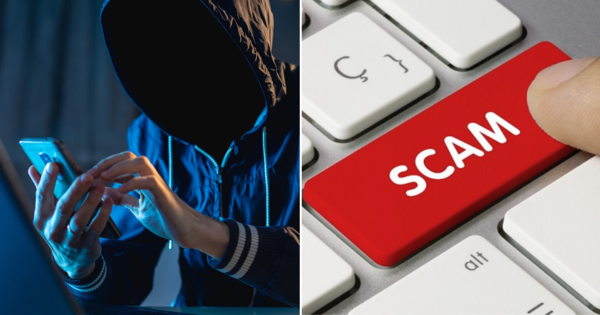Follow us on Instagram, TikTok, and Telegram for the latest stories and breaking news.
Financial scams are at an all-time high in Malaysia, with the trend significantly increasing this past year alone
In order to combat these crimes, the government has recently opened up the National Scam Response Centre (NSRC), to provide aid to the public in the unfortunate event they are scammed.
A joint effort between the National Anti-Financial Crime Centre (NFCC), Bank Negara Malaysia (BNM), the Malaysian Communications and Multimedia Commission (MCMC), the Royal Malaysia Police (RMP), as well as other financial and telecommunication institutions, various resources and experts have created the centre in an effect to deter scams faster and with more efficiency.
Focusing on financial extortion, the NRSC will help individuals who fall prey to numerous kinds of scams, including phishing scams, Macau scams, malware attack scams, package delivery or parcel scams, and even love scams.
While their origins definitely act as a glimmer of hope for the future of financial scams in Malaysia, one question still remains: how does it work?
Image for illustration purposes only.
Image via Home Ownership Matters
Here’s everything you need to know about accessing the NSRC if you get scammed:
1. I just noticed a large amount of money is missing from my bank account! What should I do?
Don’t panic! Take action at once.
Once you’ve discovered suspicious activity within your bank account, call the NSRC hotline at 997 immediately.
It is crucial to call 997 as soon as you discover that you’ve been scammed. This will allow banks to intercept your stolen funds and potentially save thousands of ringgit you have in your accounts.
The hotline is available every day, including public holidays, between 8am and 8pm.
2. I discovered my scam outside the 12-hour window for the NSRC hotline, what do I do now?
Call your bank and inform them instead. This can be done through the 24-hour hotline available for all banks in Malaysia. Click here for a list of bank hotline numbers.
It is important to contact your bank and inform them of the scam even if it occurred more than 24 hours ago. The NSRC’s hotline is meant to be an emergency response number, and may not provide fast replies in situations where the fraud took place within an extended period of time.
The NSRC encourages all individuals who may have faced these scams to contact their respective banks even if they have called the hotline, to increase chances of solving the scam quicker.
If you have contacted your bank first, you will not need to contact the NSRC afterwards.
Image for illustration purposes only.
Image via South China Morning Post
3. I’m having issues with accessing my bank account, can I call NSRC instead?
No, you should not call the NSRC, as they are an emergency hotline response number.
If there are issues with your bank account (inaccessibility, blocked, etc.), contact your bank and explain the situation to them. If you’ve been scammed, your bank account may have been blocked due to suspicion of the account being used as a medium for extortion.
Furthermore, any complains or feedback concerning your bank account should be made directly to the bank’s complaint unit, which can be found here. If the response you receive is unsatisfactory, you may carry out a further enquiry by reaching out to BNM TELELINK.
4. I’ve already informed NSRC/my bank, what do I do now?
Lodge a police report.
It is important to understand that a formal investigation needs to be opened to look into everything that happened during the scam, even if you’ve been able to save the amount that was intended to be stolen.
Therefore, it would be most convenient to head to your nearest police station and draft a police report AFTER calling your bank or the NSRC hotline. In any circumstance, you must report the incident to the police, even after informing your bank or NSRC.
5. What information do I need to provide when reporting the scam?
When making a report to the NSRC, your respective bank, or to the police, you should have the following information on hand:
– A chronological order of the events that took place during the scam incident.
– Your personal details (name, contact number, identification card (IC), and bank account number).
– Any details about the scammer (name, contact number, and anything pertinent to the investigation).
– Details of the scammed transaction (time of transaction, amount transferred, bank account number(s), websites shared by scammer, and screenshots of conversations if applicable).
None of these institutions will request sensitive information from you when it comes to personal banking information, which include your account username, password, PIN, TAC, or OTP.
You will be allowed to contact the police investigating officer assigned to your case for an update on your investigation, or check the status of your police report online here.
Image for illustration purposes only.
Image via picjumbo.com/Pexels
6. I’ve completed making a police report. Can I contact the NSRC hotline to follow up on my case?
It is important to remember that the NSRC’s 997 number is an emergency hotline ONLY, and is not to be used as a call centre for follow ups.
As stated above, you may visit the curated website to check on the status on your police report, or call the police investigating officer assigned to your case directly.
That’s it! You’ve done all you can, and hopefully, any potential scams you faced will be dealt with accordingly.
For more information on the NSRC, click here.
Stay updated on potential scams that are taking place in the nation by visiting the Facebook page of Amaran Scam.
Image for illustration purposes only.
Image via Channel Post MEA



